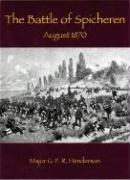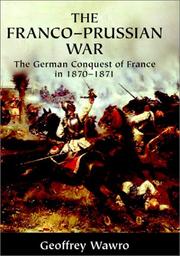| Listing 1 - 10 of 18 | << page >> |
Sort by
|
Book
ISBN: 1912174677 9781912174676 Year: 2015 Publisher: Helion and Company
Abstract | Keywords | Export | Availability | Bookmark
 Loading...
Loading...Choose an application
- Reference Manager
- EndNote
- RefWorks (Direct export to RefWorks)
Franco-Prussian War, 1870-1871 --- Campaigns --- Franco-Prussian War (1870-1871) --- 1870 - 1871 --- Picardy (France) --- History, Military

ISBN: 1907677577 9781907677571 9781874622444 1874622442 Year: 2009 Publisher: Solihull Helion & Co.
Abstract | Keywords | Export | Availability | Bookmark
 Loading...
Loading...Choose an application
- Reference Manager
- EndNote
- RefWorks (Direct export to RefWorks)
This account, penned by a noted British military historian of the late nineteenth century, remains one of the nest narratives of a nineteenth century battle yet published. Henderson based this detailed and considered account of one of the opening battles of the Franco-Prussian War upon not only General Staff works and other official sources, but also many other accounts, including regimental histories. Also includes comprehensive maps.
Book
ISBN: 1800341628 1789627710 9781789627718 1789621925 9781789621921 Year: 2020 Publisher: Liverpool Liverpool University Press
Abstract | Keywords | Export | Availability | Bookmark
 Loading...
Loading...Choose an application
- Reference Manager
- EndNote
- RefWorks (Direct export to RefWorks)
During the Siege of Paris, literature was big business. A study of cultural production and consumption, 'The Culture of War' examines how Parisians fuelled the industries of literature even as the Prussian blockade isolated them from the outside world in the winter of 1870-1871.
Franco-Prussian War, 1870-1871. --- Books and reading --- History --- Franco-Prussian War --- History of Paris --- History of the book --- Literature of war --- Cultural history

ISBN: 110738527X 128111295X 9786611112950 0511338376 1139130005 0511337817 0511336632 0511511825 0511337280 9780511338373 9780511252150 0511252153 9780511253607 0511253605 9781281112958 9780511337284 9780511336638 0521584361 9780521584364 0521584361 9780521584364 9780511511820 9780521617437 052161743X 6611112952 9781139130004 9780511337819 110715734X Year: 2003 Publisher: Cambridge Cambridge University Press
Abstract | Keywords | Export | Availability | Bookmark
 Loading...
Loading...Choose an application
- Reference Manager
- EndNote
- RefWorks (Direct export to RefWorks)
The Franco-Prussian War of 1870-1 violently changed the course of European History. Alarmed by Bismarck's territorial ambitions and the Prussian army's crushing defeats of Denmark in 1864 and Austria in 1866, French Emperor Napoleon III vowed to bring Prussia to heel. Digging into many European and American archives for the first time, Geoffrey Wawro's The Franco-Prussian War describes the war that followed in thrilling detail. While the armies mobilized in July 1870, the conflict appeared 'too close to call'. Prussia and its German allies overwhelmingly outnumbered the French. But Marshal Achille Bazaine's grognards ('old grumblers') were the stuff of legend, the most resourceful, battle-hardened, sharp-shooting troops in Europe. From the political intrigues that began and ended the war to the bloody battles at Gravelotte and Sedan and the last murderous fights on the Loire and in Paris, this is a stunning, authoritative history of the Franco-Prussian War.
Franco-Prussian War, 1870-1871. --- Franco-German War, 1870-1871 --- France --- Germany --- History --- History, Military --- #A0507HI --- Franco-Prussian War, 1870-1871 --- Second Empire, 1852-1870 --- History [Military ] --- 19th century --- Arts and Humanities
Book
ISBN: 1474226175 1474226159 9781474226158 9781474226165 1474226167 9781474226172 9781474226141 1474226140 Year: 2018 Publisher: London ; New York : Bloomsbury Academic,
Abstract | Keywords | Export | Availability | Bookmark
 Loading...
Loading...Choose an application
- Reference Manager
- EndNote
- RefWorks (Direct export to RefWorks)
"This study examines the force of tradition in conservative German visual culture. It explores thematic continuities in the post-conflict representation of battlefield identities, from the 25th anniversary of the Franco-Prussian War in 1895 to the demise of the Weimar Republic in 1933. Using 40 carefully chosen images from both high and low culture, Paul Fox discusses complex and interdependent responses in German visual culture to a wide spectrum of operational military experience. These include regional conflict, total war, internal security operations and border skirmishes during the period. The book demonstrates how conservative artists, illustrators, photographers, and sculptors engaged in representing this full spectrum of conflict were preoccupied with the inequalities of battlefield encounters and the consequential quest for moral advantage. They furnished material that exemplified everything positive the ideal German male could hope to be when at war - even when the outcome was defeat. Their construction of an imagined martial masculinity based on an aggressive moral superiority was so deeply rooted that the continuities taken forward eventually provided a basis for a programmatic imagining of how Germany might again exert its political presence as a great military power in Central Europe after 1918. The Image of the Soldier in German Culture, 1871--1933 is an important volume for any historian interested in cultural history, the history of modern Germany or the First World War."--Provided by publisher.
Franco-Prussian War, 1870-1871 --- Masculinity in art. --- Militarism --- Soldiers in art. --- Soldiers --- World War, 1914-1918 --- History. --- Germany --- History, Military --- Historiography.
Book
ISBN: 1473831458 147383287X 9781473831452 9781781593547 178159354X 9781473832879 Year: 2013 Publisher: Barnsley, South Yorkshire
Abstract | Keywords | Export | Availability | Bookmark
 Loading...
Loading...Choose an application
- Reference Manager
- EndNote
- RefWorks (Direct export to RefWorks)
Tension and rivalry between France and Germany shaped the history of Western Europe in the century from 1860. Three times that hostility led to war and the invasion of France - in 1870, 1914 and 1940. The outcomes of the battles that followed reset the balance of power across the continent. Yet the German invasions tend to be viewed as separate events, in isolation, rather than as connected episodes in the confrontation between the two nations.
Franco-Prussian War, 1870-1871. --- World War, 1914-1918 --- World War, 1939-1945 --- Franco-German War, 1870-1871 --- Campaigns --- International relations. --- Military campaigns. --- History. --- Franco-Prussian War (1870-1871). --- World War (1914-1918). --- World War (1939-1945). --- 1870-1871. --- Germany --- France --- Western Front (World War (1939-1945)). --- France. --- Germany. --- Western Front (World War (1914-1918)). --- History, Military. --- Relations

ISBN: 1134734697 1280373989 9786610373987 0203134249 9780203134245 020317920X 9780203179208 9781280373985 6610373981 0415154332 9780415154338 9781134734641 9781134734689 9781134734696 9781138156203 1134734689 Year: 1997 Publisher: London New York Routledge
Abstract | Keywords | Export | Availability | Bookmark
 Loading...
Loading...Choose an application
- Reference Manager
- EndNote
- RefWorks (Direct export to RefWorks)
In Napoleon III and the Second Empire, Roger D. Price considers the mid-century crisis which provided Louis-Napoleon Bonaparte with the opportunity to gain elective office as President. The author outlines the objectives of Napoleon III and provides: * A historiographical review of the ruler and his regime * Details of changing historical attitudes to the period * A survey of Napoleon III's economic, social and political impact * An outline of the man's reign and his achievements
Franco-Prussian War, 1870-1871 --- Franco-German War, 1870-1871 --- Influence. --- Napoleon --- Bonaparte, Charles-Louis-Napoléon, --- Bonaparte, Louis-Napoléon, --- Bonaparte, Napoléon-Louis, --- Louis-Napoléon, --- Ludwik Napoleon, --- France --- Kings and rulers --- History
Book
ISBN: 0773596356 9780773596351 9780773596368 0773596364 9780773544093 0773544097 Year: 2014 Publisher: Montreal McGill-Queen's University Press
Abstract | Keywords | Export | Availability | Bookmark
 Loading...
Loading...Choose an application
- Reference Manager
- EndNote
- RefWorks (Direct export to RefWorks)
The British ambassador in Washington during the US Civil War and ambassador in Paris before and after the Franco-Prussian war, Lord Lyons (1817-1887) was one of the most important diplomats of the Victorian period. Although frequently featured in histories of the United States and Europe in the second half of the nineteenth century, and in discussions and analyses of British foreign policy, he has remained an ill-defined figure. In Lord Lyons: A Diplomat in an Age of Nationalism and War, Brian Jenkins explains the man and examines his career. Based on a staggering study of primary sources, he presents a convincing portrait of a subject who rarely revealed himself personally. Though he avoided publicity, Lyons came to be regarded as his nation's premier diplomat as his career took him to the heart of the great international issues and crises of his generation. As minister to the United States he played a vital role in preserving Anglo-American peace and was a powerful voice opposing Anglo-French intervention in the Civil War. While ambassador to the Ottoman Empire, he helped to prevent French control of the Suez Canal then under construction. In France, he maintained an amiable and constructive relationship with a bitter nation struggling to reorganize itself and its constitution after the Franco-Prussian War. For many historians Lord Lyons has been difficult to ignore but hard to admire. In rescuing him as a truly important historical figure, Jenkins details for the first time the personal and public strategies Lyons employed through decades of exemplary diplomatic service on both sides of the Atlantic. -- Provided by publisher.
Diplomats --- Diplomatic and consular service, British --- Franco-Prussian War, 1870-1871 --- Franco-German War, 1870-1871 --- British diplomatic and consular service --- History --- Diplomatic history. --- Lyons, Richard Bickerton Pemell Lyons, --- Lyons, --- Great Britain --- United States --- Foreign relations --- Diplomacy --- Diplomatic history
Book
ISBN: 1907677593 9781907677595 Year: 2009 Publisher: West Midlands, England Helion & Co., Ltd.
Abstract | Keywords | Export | Availability | Bookmark
 Loading...
Loading...Choose an application
- Reference Manager
- EndNote
- RefWorks (Direct export to RefWorks)
In the second part of this comprehensive all-new two-volume military history of the Franco-Prussian War, the author continues his narrative from the fall of the Second Empire until the ending of the war, and the founding of a unified Germany. The war against the Government of National Defence presented quite different problems to von Moltke and his staff. Although the Siege of Paris loomed large during the second phase of the war, the author fully explores events in other parts of France, including the siege of Strasbourg, the activities of the Francs Tireurs, the investment of Metz, and the b
Sedan Campaign, 1870. --- Franco-Prussian War, 1870-1871 --- Campaigns. --- Campaigns --- Moltke, Helmuth, --- Moltke, --- Moltke, Helmuth Charles-Bernard, --- Moltke, Helmuth Karl Bernhard, --- Von Moltke, Helmuth, --- Germany --- History, Military --- Molʹtke, Gelʹmut fon,
Book
ISBN: 1907677585 9781907677588 Year: 2009 Publisher: West Midlands, England Helion & Co., Ltd.
Abstract | Keywords | Export | Availability | Bookmark
 Loading...
Loading...Choose an application
- Reference Manager
- EndNote
- RefWorks (Direct export to RefWorks)
In the first part of this comprehensive all-new two-volume military history of the Franco-Prussian War, Quintin Barry presents a detailed account of the war against the French Imperial Army waged by the armies of the German Confederation, directed by that supreme military mind, Helmuth von Moltke. The author places Moltke and his strategic planning in the context of the European balance of power following the ending of the Austria Prussian War of 1866, before exploring the initial mobilization and deployment of the armies in 1870. All of the battles of this opening round of the war are describ
Sedan Campaign, 1870. --- Franco-Prussian War, 1870-1871 --- Campaigns. --- Campaigns --- Moltke, Helmuth, --- Moltke, --- Moltke, Helmuth Charles-Bernard, --- Moltke, Helmuth Karl Bernhard, --- Von Moltke, Helmuth, --- Germany --- History, Military --- Molʹtke, Gelʹmut fon,
| Listing 1 - 10 of 18 | << page >> |
Sort by
|

 Search
Search Feedback
Feedback About UniCat
About UniCat  Help
Help News
News